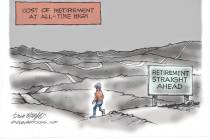Nevada Views: Is gun registration worth cost?
Clark County Sheriff Doug Gillespie is in a deep financial hole - a $46.5 million hole.
Government executives seldom are forced to make real budget cuts; they just make do with increases that are less than what they requested. Real cuts, when necessary, are difficult and painful. I've had the experience and didn't enjoy it. Every official program has its advocates and its bureaucratic momentum and is bolstered by the thought: "We wouldn't be doing it if it wasn't necessary."
If additional revenues aren't forthcoming, Gillespie must make some tough decisions about the functions of the Metropolitan Police Department. In the meantime, however, he's made a compelling case, albeit inadvertently, that one of his programs should ride off into the sunset.
Seven decades ago, Lucky Luciano, Frank Costello, Meyer Lansky and their pals from New York decided that Clark County was ripe for expanding mob operations, and organized crime arrived in Las Vegas - complete with armed "soldiers" for protection and muscle. In response, the county adopted the ordinance requiring the registration of handguns. (The idea probably came from California, where some form of handgun registration has been required since at least the end of World War I.) It was assumed that the mobsters wouldn't comply so, with few legal restrictions on search and seizure back then, the new ordinance provided law enforcement with some serious leverage.
The registration program, which was authorized in 1948 and then automated in 1980, has records that date back to 1973.
In 2007, when it became clear that compliance would be impossible for participants in trade shows or events held at the county's new shooting park, the registration deadline was extended to 72 hours if ownership was transferred in the county and 60 days for visitors. But it had long been an open secret that security personnel for visiting performers, sports stars and other celebrities weren't complying anyway. Such scofflaw behavior wasn't really a problem because arrests and prosecution for failing to register a handgun have been virtually unknown.
A recent exchange of letters between Gillespie and County Commissioner Tom Collins provided some fascinating insight into Metro's Firearm Registration Unit - and perhaps into the general management practices of the department.
The Firearm Registration Unit's database contains information on more than 1 million handguns. You'd think that management might find it useful to know how often this information is accessed, or how many arrests, citations or convictions have resulted from it. How many investigative leads are produced? How many handguns are seized each year for failure to register?
If you thought that such information might be a significant management tool, you'd be wrong. To each such question, the sheriff told Collins the information wasn't "tracked."
Furthermore, because the Firearm Registration Unit isn't a budget line item, the sheriff said he couldn't provide any information on expenditures for either the unit itself or the related data processing.
So after 60 years of operation, the sheriff seems to know nothing about the program he so vigorously defends. Collins asked for "objective data" that would lead a reasonable person to conclude that the handgun registration program had real law-enforcement benefit to Clark County. The sheriff's response: "Officers benefit from the use of the database every day. If it did not provide valuable investigative leads, it would not be accessed by the officers."
Perhaps it's just the nature of the beast. Put the same questions to the folks who manage California's handgun registration system and you get the same answers. Not only that, but after almost a century most handguns in California are still unregistered. The latest gun registration experiment took place in Canada. After spending $2 billion to get it operational, five months ago the Canadian Parliament decided to dismantle it.
Just how much Metro spends on handgun registration is a "puzzlement." A million dollars-plus seems likely. Given the available program data, it's hard to image a coherent argument for its continuation. If Metro tries to justify continued funding, you can expect a blizzard of anecdotes.
Steve Helsley retired as the assistant director for the California Department of Justice. He later served as the Nevada liaison for the National Rifle Association's Institute for Legislative Action.























